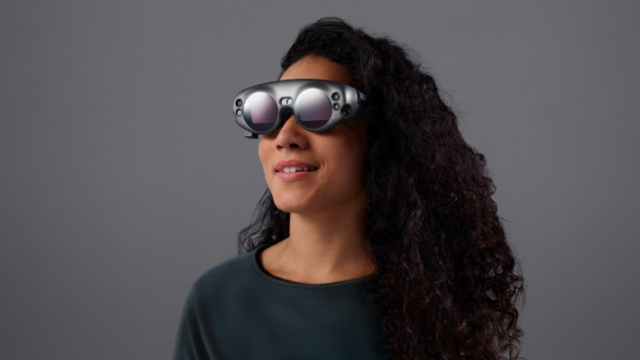Under mysterious circumstances, some Magic Leap augmented reality headsets have started showing up at software developers’ offices. The headset itself is even more mysterious, in that access to it requires a commitment from the user that they keep it in a locked safe. Apparently, the Florida-based startup is worried about the balance of testing the product while losing control of it out in the wild. Magic Leap, which has raised more than $2.3 billion, has promised to deliver more sets to more developers later this year.
“Magic Leap is the most prominent startup working on augmented reality, a technology that makes it appear as though three-dimensional digital objects exist in the physical world,” according to Bloomberg, which notes that the startup is “one of America’s top-funded tech startups in recent years.”
The first look at these devices shows “bulky safety goggles dotted with small camera lenses. They work in conjunction with a small computer that clips to a user’s belt and a wireless controller that somewhat resembles a television remote,” explains Bloomberg.
Magic Leap has allowed some investors, potential business partners, and select journalists to use the devices after signing non-disclosure agreements. As the company ventures into sharing the product with developers, some aren’t interested in taking part in the top-secretive reveal.
“At least one company decided it wasn’t worth the hassle and declined a test device, said a person familiar with the matter, who asked not to be identified due to Magic Leap’s tight information rules,” reports Bloomberg.
In fact, due to the high levels of secrecy, some wonder about Magic Leap’s ability to execute an actual, full release. This doesn’t pair well with other news about internal issues at the company.
“The view of a profligate startup struggling to make good on its promises has been reinforced by unflattering information leaking out through litigation with former employees. People at the company have complained privately that criticism has gotten out of hand,” writes Bloomberg.
Another hurdle involves the major tech companies that are also in the race to build consumer-friendly augmented reality platforms. One such competitor is Microsoft, which released its HoloLens headset two years ago.
“The biggest difference between Magic Leap’s and Microsoft’s headsets is the way they create the illusion of depth,” suggests the article. “Previous iterations of augmented and virtual reality headsets do this by showing slightly different versions of an image to each eye. The Magic Leap One [pictured above], the name of its initial product, goes an extra step by slightly blurring objects depending on their distance from a user’s gaze. This mimics a function of the human eye.”
This could be a significant advantage for Magic Leap — and keeping developers interested and excited is a key part of the company’s strategy. At the recent Game Developers Conference, Magic Leap unveiled tools to let developers start working on apps for the headset.


No Comments Yet
You can be the first to comment!
Sorry, comments for this entry are closed at this time.